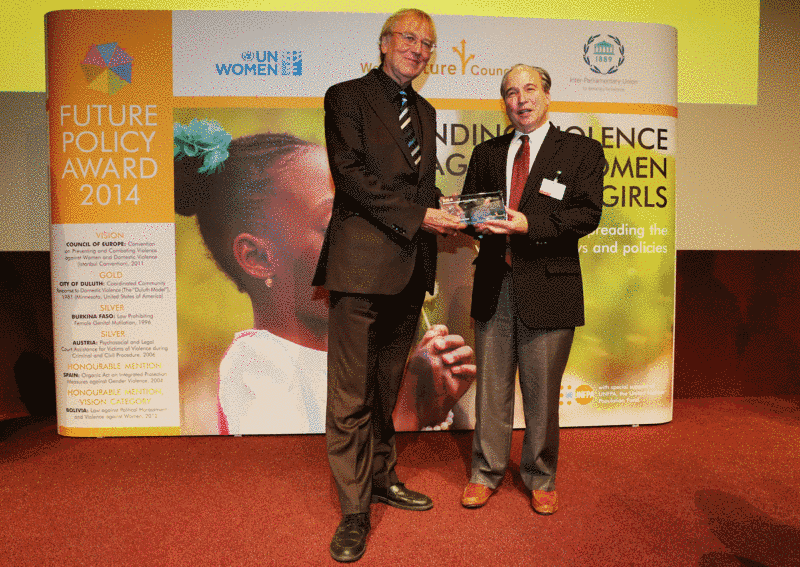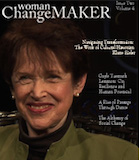A recent article in the online publication, Women of China, underscores the importance of the inclusion of unpaid care in the Post-2015 development agenda of the UN, the Sustainable Development Goals (or SDGs). The article, Put the Care Economy in the Post-2015 Development Agenda asserts that the “unequal distribution of unpaid housework – including the work associated with caring for people – between men and women undermines society’s progress toward gender equity”. Citing her 2007 book, The Real Wealth of Nations, Dr. Eisler’s argument is brought to light across the globe that including the work of caring for people and nature in economic metrics and including it in what we value will make great strides toward “an equal partnership between men and women.” Read the full article in Women of China, the publication of the All-China Women’s Federation, HERE.
PDFs
Why Swedish Men Take so Much Paternity Leave
Originally published on The Economist
Along with its Nordic neighbours, Sweden features near the top of most gender-equality rankings. The World Economic Forum rates it as having one of the narrowest gender gaps in the world. But Sweden is not only a good place to be a woman: it also appears to be an idyll for new dads. Close to 90% of Swedish fathers take paternity leave. Last year some 340,000 dads took a total of 12m days’ leave, equivalent to about seven weeks each. Women take even more leave days to spend time with their children, but the gap is shrinking. Why do Swedish dads take so much time off work to raise their children?
Forty years ago Sweden became the first country in the world to introduce a gender-neutral paid parental-leave allowance. This involves paying 90% of wages for 180 days per child, and parents were free to divvy up the days between them in whatever way they pleased. But the policy was hardly a hit with dads: in the scheme’s first year men took only 0.5% of all paid parental leave.
Today they take a quarter of it. One reason is that the scheme has become more generous, with the number of paid leave days for the first child being bumped up from 180 to 480. But it has also been tweaked to encourage a more equal sharing of the allowance. In 1995 the first so-called “daddy month” was introduced. Under this reform, families in which each parent took at least one month of leave received an additional month to add to their total allowance. The policy was expanded in 2002 so that if the mother and father each took at least two months’ leave, the family would get two extra months. Some politicians now want to go further, proposing that the current system of shared leave be turned into one of individual entitlements, under which mothers should be allowed to take only half of the family’s total allowance, with the rest reserved for fathers.
Policies similar to the Swedish “daddy months” have been introduced in other countries. Germany amended its parental-leave scheme in 2007 along Swedish lines, and within two years the share of fathers who took paid leave jumped from 3% to over 20%. One of the most powerful arguments in favour of splitting parental leave more equally is that it has positive ripple effects for women. Since Swedish men started to take more responsibility for child rearing, women have seen both their incomes and levels of self-reported happiness increase. Paying dads to change nappies and hang out at playgrounds, in other words, seems to benefit the whole family.
Duluth, MN Awarded Gold Prize from World Future Council’s Commission on Ending Violence Against Women and Girls
The World Future Council’s Commission on Ending Violence Against Women and Girls, co-chaired by WFC Councilors Riane Eisler and Vandana Shiva and directed by Karin Heisecke, awarded the best policy practices gold prize to the City of Duluth project at a ceremony in Geneva sponsored by the World Future Council, the Inter-Parliamentary Union (IPU) and UN Women.
In a press release this October, the World Future Council announced that “the Coordinated Community Response to Domestic Violence by the City of Duluth in the US State of Minnesota is the winner of the 2014 Future Policy Award for Ending Violence against Women and Girls. It beat 24 other nominated policies to the prize. The Gold Award is to be presented to Minnesota Representative Michael Paymar from the Minnesota House of Representatives today at a ceremony in Geneva by the World Future Council, the Inter-Parliamentary Union (IPU) and UN Women.”
“The Duluth Model won the Gold Award for effectively prioritizing the safety and autonomy of survivors while holding perpetrators to account through a coordinated response involving the whole community. This approach to implementing legislation on violence against women has since inspired violence protection laws and policies in other countries such as Austria, Germany, UK, Romania, and Australia.”
Read more on the World Future Council’s website about other entries and learn about the award and event that celebrates innovative policy solutions for ending violence against women and girls.

The Work of Riane Eisler Featured in Woman ChangeMAKER
Dr. Riane Eisler is featured in the latest edition of Woman ChangeMAKER, the e-magazine about women driving social change. In the cover story and feature article, Navigating Transformation: The Work of Cultural Historian Riane Eisler, Woman ChangeMAKER writes “her research as an evolutionary theorist resulted in a revolution in our thinking regarding the need to re-conceptualize the feminine in history and created a new vision for a possible future”.

Ending Violence Against Women and Girls Award Ceremony in Geneva
Riane Eisler is co-chair of the Commission on Ending Violence Against Women and Girls of the World Future Council (of which she is a Commissioner). The Commission is announcing the awards for Best Policies to End Violence Against Women at the 2014 IPU Assembly (formerly known as the Inter-Parliamentary Conference), co-sponsored by the World Future Council. The IPU is the principal statutory body that expresses the views of the Inter-Parliamentary Union on political issues, bringing together parliamentarians to study international problems and make recommendations for action. This year the IPU adopted a strong consensus outcome document on ending violence against women.
Please see the booklet “Ending Violence Against Women and Girls”, which is also available in Spanish and French. The booklet provides information on the design, implementation, and benefits of the winning policies, as well as recommendations for policy makers. It was launched at the FPA ceremony and has already proven very popular: it has been distributed to all delegates at the IPU plenary, it will be distributed at UN HQ, and the WFC has already received orders for larger quantities by institutions who want to distribute it among their own audiences, for example from the Council of Europe and the Spanish government.
